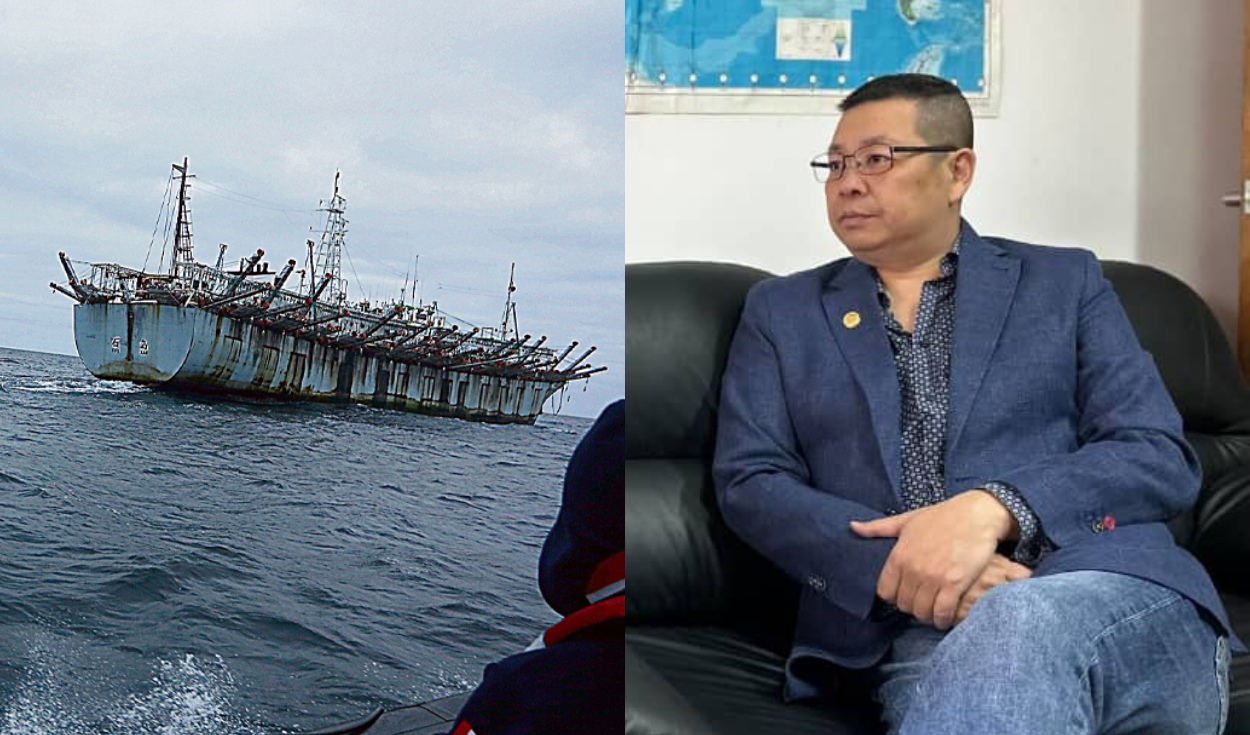
Amid protests and the announced strike by fishermen from Piura, who claim that Chinese vessels are carrying out extractive activities in Peruvian waters, La República interviewed Lei Xiao, representative of a Chinese fishing agent company in our country.
In this regard, he denied that Chinese fishing boats operate within the 200-mile zone and that they affect “the economic interests of local fishermen.” He also highlighted the cooperation between both countries and that their presence brings “economic benefits to several local port service industries.”
—Does fishing by Chinese fishing vessels affect the interests of local fishermen?
—The area of operation of Chinese fishing vessels is mainly high seas fishing in the southeastern Pacific Ocean, which is not within the exclusive economic zone of 200 nautical miles calculated from Peru’s baselines.
The method of operation is squid fishing. The species caught are deep-water giant squid, which does not include any other species. This is different from the fishing areas of Peruvian fishermen, so there is no conflict with the species they catch. The operation of Chinese fishing boats does not in any way affect the economic interests of local fishermen.
— Is there any problem with cross-border fishing in Peruvian waters by Chinese fishing vessels?
—China implements strict management and supervision of the use of positioning systems by Chinese distant-water fishing vessels.
According to the Chinese Government’s “Regulations on the Management of Position Tracking of Distant-Water Fishing Vessels”, all Chinese fishing vessels—including fishing auxiliary vessels approved by the Ministry of Agriculture and Rural Affairs of the People’s Republic of China to engage in distant-water fishing—must install position tracking equipment and be included in the Ministry’s distant-water fishing vessel position tracking system.
These measures aim to strengthen distant water fisheries management, ensure the safety of distant water fishing vessels and comply with relevant international obligations.
Ship positioning systems currently installed on China’s distant-water fishing vessels include the International Maritime Satellite Organization’s INMARSAT/C station system, GPS ship positioning system and other equipment compatible with the ship position tracking system.
They are also equipped with Automatic Identification System (AIS) to report related information. Peruvian authorities can use the above-mentioned systems to monitor the position of Chinese fishing vessels in distant waters in real time.
In compliance with the requirements of the Peruvian authorities, before entering Peru’s 200-nautical-mile exclusive economic zone, Chinese fishing vessels provide information including the amount of fish on board and provide the record of all navigation tracks in the past six months after arriving at the Peruvian port. Therefore, the accusations about Chinese fishing vessels illegally fishing in Peru or the Peruvian authorities’ ignorance of the navigation record of Chinese fishing vessels are not true.
China has implemented the world’s strictest measures to monitor the position of fishing vessels in distant waters and strictly prohibits illegal fishing. China and Peru have always maintained communication on cooperation in the fisheries area. The two sides can further strengthen the mechanisms of bilateral fisheries cooperation and jointly fight against illegal fishing.
—What is your opinion on the recent problems faced by Chinese fishing vessels in Peruvian ports?
—In mid-July this year, a Chinese fishing boat entered a port in northern Peru for routine inspection. When it was anchored in the anchorage, it was attacked and harassed by some local opponents in an extreme manner. With the timely intervention and control of the local port authorities, the situation did not deteriorate further. However, these illegal activities should not be given free rein. Malicious exaggerations have misled the public.
Chinese fishing vessels always operate on the high seas and normally enter ports after obtaining prior approval from local port authorities. Chinese fishing vessels enter the port out of trust in Peruvian authorities and the quality of port services, and bring economic benefits to various local port service industries. Chinese fishing vessels have never caused pollution to Peruvian ports and waters.
— How do you view China-Peru fisheries cooperation and its prospects?
— China’s support for Peru’s artisanal fisheries is pragmatic and both sides have greatly benefited from fisheries cooperation. According to statistics from OCEANA, the Oceanographic Association of Peru, Peru’s fishmeal exports to China in 2023 amounted to 424,698 tons, worth approximately US$730.9 million, representing 79% of Peru’s total fishmeal exports.
According to the Peruvian ambassador to China, Luis Quesada, fishing was the most dynamic productive sector in Peru in 2021, with an 88% increase in its exports, of which white shrimp increased by 372% and large squid by 235%, showing the competitiveness of Peruvian fishing in global markets.
Peruvian fisheries are characterized by high-quality, diverse and nutritious products, as well as a long-standing fishing culture and tradition. Peruvian fishery products such as frozen squid and fish liver are very popular in the Chinese market due to their nutritional value and high quality. Fisheries cooperation between China and Peru is mutually beneficial with shared interests.
We have been working in fishery services in Peru for nearly 18 years. Peru is our second hometown. I have personally experienced the process of developing ever closer cooperation between China and Peru. I hope that the fishery cooperation between the two countries will continue to deepen and the friendship will become stronger. The entry of Chinese fishing vessels into Peruvian ports can bring economic benefits of tens of millions of dollars per year to the ship maintenance industry, and provide a large number of employment opportunities for relevant auxiliary industries to help economic development.
Source: Larepublica
Alia is a professional author and journalist, working at 247 news agency. She writes on various topics from economy news to general interest pieces, providing readers with relevant and informative content. With years of experience, she brings a unique perspective and in-depth analysis to her work.











